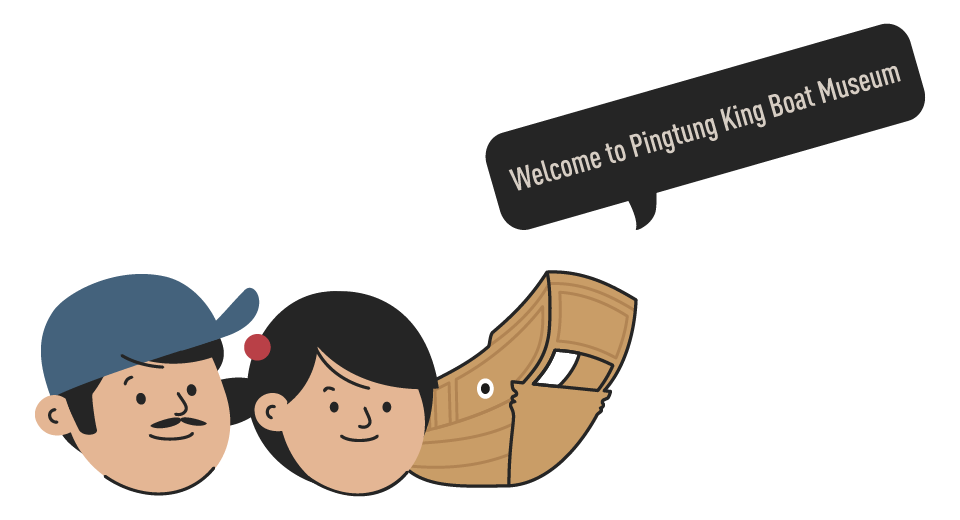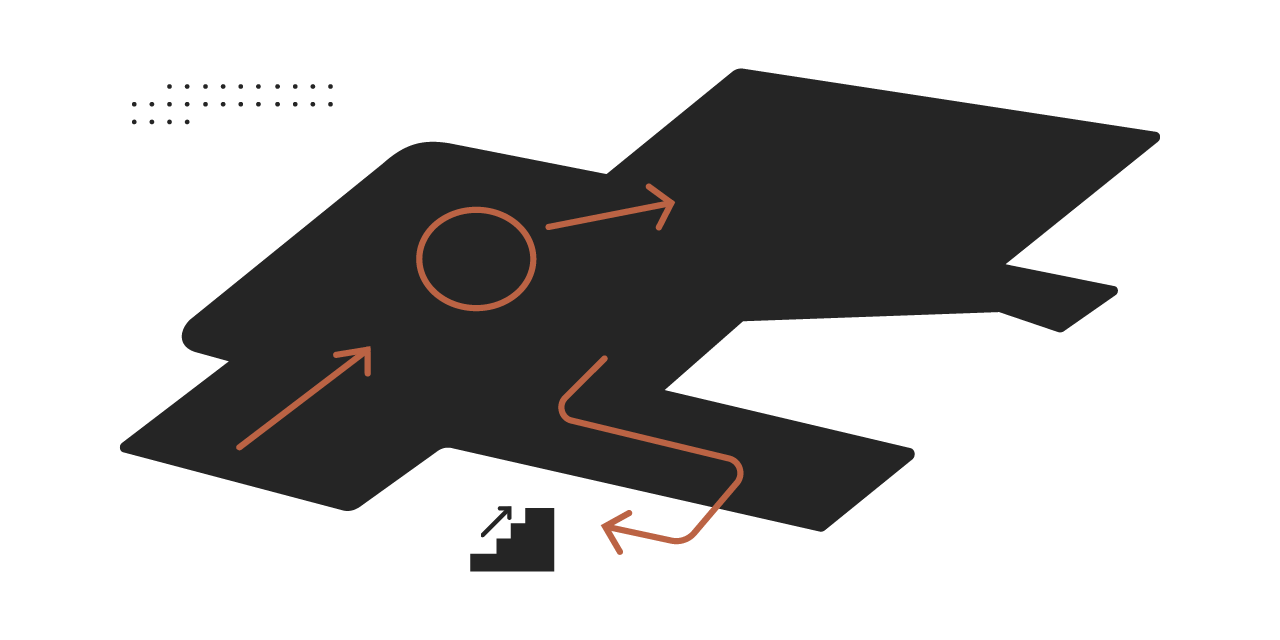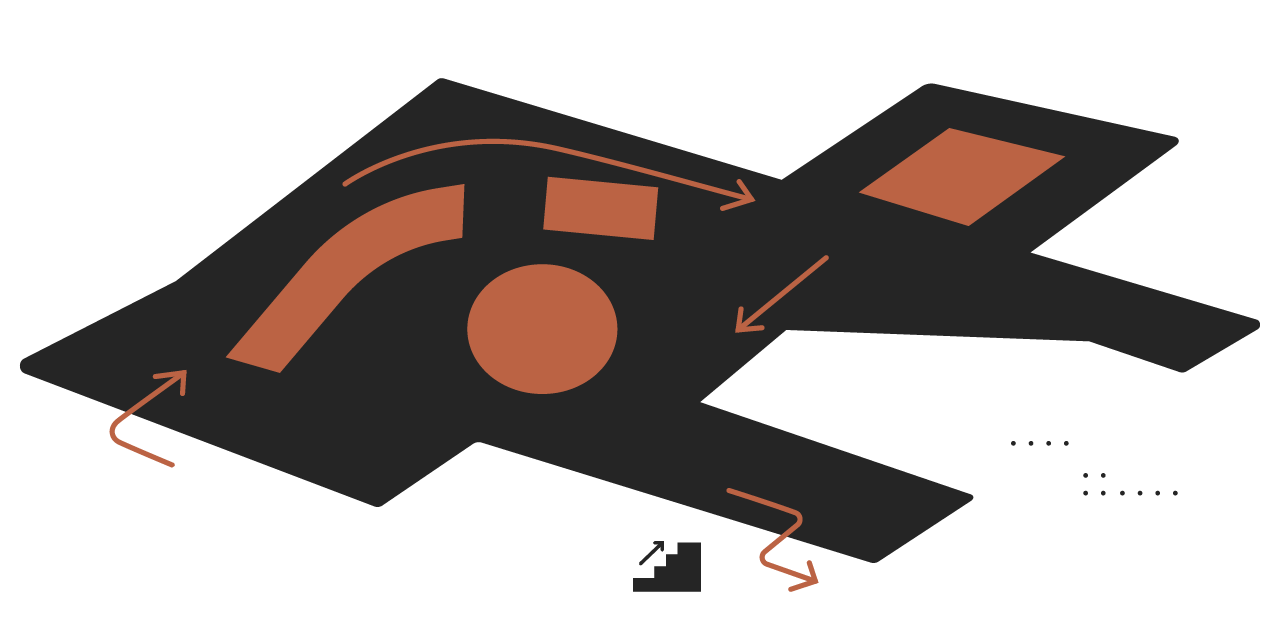
Xiaohai: Wowie! Wow! Look, Dad! Look how many candies I caught.
Dad: Great! The more, the better! Today they’re holding a ceremony of painting the King Boat’s eyes. That’s why they’re tossing out lucky candy and cookies. When the ceremony is finished, the King Boat comes alive. It becomes a divine spirit.
Xiaohai: The King Boat is huge! My teacher says it’s a Donggang highlight. But why do we need to build such big boats?
Lord King Boat: Hi, Xiaohai!
Xiaohai: Eh? Who’s that?
Lord King Boat: I’m the King Boat. I carry the Wangye sky patrol up to the heavens. I also help Wangye drive plague ghosts and spirits out of our mortal world. Come on, Xiaohai, come aboard. Before the Wangye invitation ceremony starts, let me tell you some stories about me and Wangye.
Dad: Don’t be afraid, Xiaohai. Lord King Boat is calling to you.
Xiaohai: I’m not afraid. But it seems like magic!
Dad: [Chuckles] Dear friends who come to Donggang, does it seem like magic to you? Donggang residents are all very proud of our King Boat tradition. Welcome to the Pingtung King Boat Museum! It is the only museum in Taiwan which focuses on the belief of the Wangye and King Boat. It not only features the Donggang King Boat but also has an immersive theater with 360-degree projection, allowing visitors to immerse themselves in the pomp and pageantry of the Wangye Invitation Ceremony. Now, let’s visit the triennial Donggang King Boat Burning Festival.

Xiaohai: Look, Dad! There are two small boats.
Lord King Boat: They’re both King Boats, just like me!
Xiaohai: Lord King Boat, I’m so glad to see you again. Could you tell me the story of the two small King Boats?
Dad: In the past, people who lived along the coast would send ships to sea to exorcise plagues and sickness. In some traditions, the boats are allowed to drift with the current, sometimes on rivers. In other traditions, the boats are burned, and some are worshipped in temples. These two small boats symbolize the “Eternal Sacrificial King Boats" used in temple rituals.
Xiaohai: If you look carefully, you will find that one boat is bigger and the other is smaller. Their prows point in different directions.
Lord King Boat: You’ve got sharp eyes, Xiaohai. The small boat’s prow points outward, and the big boat's prow points inward. That means the smaller boat is going out to sea, and the big one is returning to port with a full catch of fish. It suggests you can get rich with a small amount of investment.
Xiaohai: Both boats have eyes.
Dad: They’re called “dragon eyes.” Remember the almond-shaped opening we saw up on the building’s exterior? That symbolizes dragon eyes! After visiting the museum, let’s take another look outside. It is said that the slanted lines at the bottom of the façade represent ocean waves.
Xiaohai: Hey, Dad! There’s the immersive theater!
Dad: They’re showing films of two Wangye ceremonies. Hold on, Xiaohai! Wait for me!

Lord King Boat: Come, Xiaohai. I’ll introduce to you an important Taiwanese belief. Can you name some well-known Taiwan deities?
Xiaohai: Mazu and Wangye, right?
Lord King Boat: That’s right. Some people call Wangye “Qian Sui.” He’s very popular on Taiwan’s west coast. People celebrate Mazu’s birthday during the third lunar month and Wangye’s birthday in the fourth lunar month.
Xiaohai: I’ve heard of Wangye, but I don’t know much about His story. Please tell me, Lord King Boat.
Lord King Boat:
[Chuckles] Wangye is not a specific deity. Wangye manifests in many ways and originates in many places. It’s generally believed that the Jade Emperor sends Wangye deities as special envoys to "patrol the mortal world.” They drive away plagues and protect the people.
Taiwan’s climate has always been hot and humid, and plagues often broke out in the past. During the Ming and Qing dynasties, immigrants from southern Fujian and Guangdong brought their beliefs in the Wangye deities to Taiwan. The beliefs took root and eventually developed into our custom of sending the deities off on King Boats to expel epidemics.
Xiaohai: My family worships Wangye too. Whenever we go to the temple, it’s always full of people. It seems everyone relies on Wangye.
Lord King Boat: Yes, indeed. Belief in Wangye is common along Taiwan’s west coast and in Penghu. Each area has its own traditions, and they’re all unique. What’s more, in some places, the king boats themselves have become deities, not just ceremonial vessels as they used to be. I can also protect people!
Xiaohai: Please watch over me, Lord King Boat!

Xiaohai: Lord King Boat, I really like our Donggang Wangye Invitation Ceremony. It’s so lively and exciting!
Lord King Boat: [Chuckles] I like it too! Xiaohai, have you heard the saying “Xigang in the north, Donggang in the south?” Other places also have Wangye Invitation Ceremonies.
Xiaohai: Oh, there are others?
Lord King Boat:
[Chuckles] That’s right, Xiaohai! Let’s visit Tainan and Yunlin!
First let’s go to Xigang. It’s a popular pilgrimage site in Tainan. It's set in a rural area. The King Boat’s masts fly carp flags, not tailwind flags. The boat’s hold is shaped like those of officials’ ships in the Ming and Qing dynasties, and it’s divided into thirteen cabins. Xiaohai, you can take a look at the thirteen cabins in a bit!
Xiaohai: What about Wangye ceremonies in other places?
Lord King Boat: The origin of the Daitianfu Temple in Nankunshen, Tainan, is very interesting. It began when a King Boat drifted there from other places, so people built a temple on the spot. Although it doesn't hold a Wangye Invitation Ceremony, Nankunshen Daitianfu is known as "Taiwan’s main Wangye temple” because it spreads out so much division of the deities.
Xiaohai: The King Boat drifted to Taiwan for such a long distance. That’s a miracle!
Lord King Boat: The “Three Major Temples of the Nanguan Line” are Renshou Temple in Guiren, Shanxi Temple, and Baoxi Daitian Temple in Guanmiao. These temples have maintained a friendly “three-way alliance” for over a century. Whenever one temple holds a Wangye ceremony, the other two join in the festival with divine palanquins and martial arts troupes.
Xiaohai: So deities make friends, just like we do!
Lord King Boat: It’s true. Next is Yunlin’s “Five-Year Deity Ceremony at Maming Mountain.” The grand celebrations are held every five years and are associated with various Wangye beliefs and practices, including a "Dragon Boat Guard Changing" ceremony, in which the three deities exchange duties. The festivals in different places in Taiwan are truly eye-opening and fascinating.

Xiaohai: Lord King Boat, “inviting Wangye” means welcoming the Qian Sui deities when they descend from heaven, right? Where will they stay after they arrive in Donggang?
Lord King Boat: The Qian Sui deities stay in "Daitian Palace,” which is constructed in Donglong Temple’s main hall. The Wangye Invitation Ceremony is held once every three years, so Daitian Palace has to be rebuilt every three years.
Xiaohai: Daitian Palace is the Qian Sui deities’ temporary office, right?
Lord King Boat: Right! The ceremony lasts for eight days and seven nights. During that time, the Qian Sui deities work and rest in Daitian Palace. Palace construction begins three days before the deities arrive. First, the upper beam is raised. “Beam mounting” is a traditional construction ceremony. When gold Taichi spirit paper, red cloth bags, and savory rice dumplings are tied to the middle beam, it means that the temple construction is complete.
Xiaohai: What’s in the red cloth bags?
Lord King Boat: The bags hold copper coins, tin, charcoal, grains, and iron nails. They represent bountiful harvests, the increase of family members and wealth, as well as endless prosperity.
Xiaohai: Can the Qian Sui deities enter the palace then?
Lord King Boat: Not yet. When the red paper covering with the inscription "Daitianfu" on the temporary archway is lifted away, it shows that everything is ready. The offerings table is covered with a python-and-dragon altar cloth embroidered with "Daitianfu” and laden with delicious foods, fruits, tea, wine, steamed rice cakes, and firecrackers. After everyone pays homage according to tradition, Wen Wangye and Lord Zhongjun are invited to take seats in the palace, and the ceremony is completed. Also, from that point on, ordinary people are not permitted to enter!
Xiaohai: One more question: When the main hall is converted into Daitian Palace, where do the deities who usually live there go?
Lord King Boat: The statue of Lord Wen, the palace guardian, stays in the main hall but the other Wangye statues are temporarily placed in a temple wing.
Xiaohai: Hey, everybody! There’s a beautiful model wooden palace in the second-floor exhibition hall. Don't miss it!

Xiaohai: Hey, look at all the lanterns! I’ll count them––1, 2, 3, 4… Wow! 36 lanterns altogether, and there’s writing on them.
Lord King Boat: There are 36 place names written on them. During the festivals, they’ll be hung next to the palace stage. When preparing to send the Wangye deities off, the lanterns will be hung on the sides of the King Boat. It symbolizes that the King Boat can "travel to the palace, feast at the palace; travel to the countryside, feast in the countryside.”
Xiaohai: Wow! The Wangye can enjoy good food wherever it goes! What luck! Besides Taiwan, there are other place names on the lamps––Yunnan, Jiangsu… Er, I don’t recognize the others.
Lord King Boat: These place names are those of the administrative divisions established by the Nationalist government in China after Taiwan was liberated. The lanterns are unique to Donggang. Donggang’s Wangye Invitation Festival also preserves many traditional rituals handed down from different periods. Some of them, such as flag-and-lantern raising, and boat parades, are almost lost. Fortunately, they're still alive and well in Donggang!
Xiaohai: The rituals are really interesting! It’d be a shame to lose them.

Xiaohai: Look, Lord King Boat, this illuminated map shows where there are different King Boat traditions in Taiwan.
Lord King Boat: [Chuckles] It’s an interactive exhibition! C’mon, let’s go north. First, I’ll tell you about Wangye beliefs in the Bazhang River basin. In the Budai and Dongshi area, residents believe that the visiting deities who patrol the human realm on behalf of the Jade Emperor arrive on an invisible King Boat. To welcome the deities, believers carry palanquins bearing local gods into the water to greet the visitors. The custom is called “Wading in the water, welcoming Wangye.”
Xiaohai: They’re really devoted!
Lord King Boat: In addition, in the King Boat traditions on the Yunlin-Chiayi Plain, King Boats along the Puzi River are relatively small. They’re made of bamboo frames and paper mache. Four brackets are fitted at the bottom of the hull so they can moor on land to greet Wangye. If you go there, you can watch a ceremony known as "carrying boats to send off Wangye.” It’s one of the region’s highlights.
Xiaohai: Northern Taiwan, Penghu, and Kinmen all have King Boat traditions. I want to take part in other Wangye invitation ceremonies and compare them.
Lord King Boat: Let’s take a look at this interactive map and find out where you can see King Boats in Taiwan. Let’s see if we can locate our Donggang King Boat Ceremony.

Dad: Hey, where’d you go, Xiaohai?
Xiaohai: Lord King Boat took me to see different Wangye celebrations in Tainan and other places.
Dad: In Pingtung, the King Boat tradition can be divided into two regions, northern Pingtung and southern Pingtung. The geographical, ethnic, and industrial factors in different regions all impact local King Boat traditions. There are more connections with rivers and streams in northern Pingtung County, while southern Pingtung borders on the sea. Each region has different characteristics.
Xiaohai: What are the differences? First tell me about northern Pingtung.
Dad: Settlements near Pingtung City, such as Liukuaicuo, Dazhou, and Touqianxi, are close to the lower Tamsui River. People there send Wangye off on the river, not the ocean. Those places have a close relationship with Donggang. During the Wangye invitation ceremony, Wangye’s spirit tablet is temporarily enshrined in Donggang Donglong Temple, and is later retrieved on a specially chosen date. In the past, those areas didn’t build King Boats. Instead, they placed Wangye’s spirit tablet on a royal joss burner and let it float away on the river. Nowadays, some of those towns use paper King Boats; others don’t have King Boats, so they still send Wangye spirit tablet off on royal joss burners.
Xiaohai: What about southern Pingtung?
Dad: In southern Pingtung County, Donggang, Xiaoliuqiu and Nanzhou are most representative. There are also King Boats in south of Fangliao. Most are built like late Qing dynasty fishing boats, a relatively simple style. In Manzhou Township, they hold an “Eight Protections Rite.” Besides the spirit mediums and shamans common in Taiwanese folk religion, there’s also a witch from the Seqaro tribe or the indigenous Paiwan people––ethnic integration is another aspect of southern Pingtung.
Xiaohai: Interesting! Lots of places have King Boats, but none are quite alike!

Xiaohai: Dad, you said that southern Pingtung King Boat festivals have a maritime flavor. What does that mean?
Dad:
Oh, right. The King Boat beliefs in the south have evolved from originally praying for protection against plagues to now also including prayers for bountiful fishing harvests and safe sailing. In addition, whether welcoming Wangye or sending Wangye off, the ceremonies are all held at seaside. It shows that the local beliefs, industries, and culture are closely related to the ocean.
I’ll give you another example. In Xiuliuqiu, an island near Pingtung, they have a unique Wangye ritual. All the deities' palanquins are placed on fishing boats, and the boats circle the island to assist the Wangye patrol before its arrival.
Xiaohai: Wow! That’s like a parade of deities at sea! Cool! You also mentioned Nanzhou, Dad. Please tell me about it!
Dad: [chuckles] You’re keen to learn, aren’t you? The Nanzhou Wangye ceremony has a special feature. On the final day of the festival, they construct a "Dragon-and-Tiger Peace Knife Bridge." People believe that walking across the bridge will guarantee peace and happiness. By the way, Xiaohai, can you guess why these festivals are held in the fall?
Xiaohai: I know! I know! It’s because there’s less rain and fewer typhoons in autumn. The weather is perfect for celebrations.
Dad: You got it, Xiaohai! Summer is the height of the fishing season, so all the fishermen are away at sea. In late autumn, the weather is cooler, so we hold the King Boat ceremony then. The sacrificial foods are less likely to spoil, and the fishermen have free time to pray for the safety of their families and good fishing harvests in the coming year. There are lots of things to prepare for the ritual. It creates a lively atmosphere and keeps us busy, and we have a lot of fun.
Xiaohai: Whenever we welcome Wangye, all our cousins, uncles, and aunts who work in other places all come back. It’s almost like a New Year celebration!

Xiaohai: After seeing other places’ wooden King Boats, I think Donggang’s King Boat is the biggest and best!
Dad: Donggang also used paper King Boats at one time. And long, long ago, we didn’t burn the boats to send Wangye off.
Xiaohai: Huh? How did they do it in those days?
Dad:
During the Qing dynasty, Donggang residents followed an ancient custom called "roving the river.” Instead of burning the King Boats, they let them flow away on the currents. They used wooden boats so Wangye could float far off to sea. The boats were smaller then, and the hulls weren’t painted in beautiful colors.
Now we burn the King Boats. The custom is called “sailing along the Milky Way.” By the late Qing dynasty, Donggang and most other places had adopted that practice and started constructing the boats with bamboo frames and paper mache hulls.
Xiaohai: So why did we switch to the wooden King Boats we see today?
Dad: The Donggang fishing industry was thriving, and everyone believed it was because of Wangye’s blessings. Therefore, people felt they could spend a little more money to build wooden King Boats. In the meantime, with the rise in prices due to the oil crisis, paper boats were no longer so cheap! As the fishing industry continued to prosper, Donggang became home to many highly skilled shipbuilders. Some helped the temple build King Boats, and the shipyards provided the wood. Donggang has been sending Wangye off on wooden King Boats since 1973––it becomes a local tradition!
Xiaohai: There are lots of historical images of Pingtung’s King Boats in this exhibition area. Let’s find the paper boats!

Xiaohai: Dad! Why’s there so much stuff piled on the King Boat?
Dad: It's called a "full load.” In order to thank Wangye for taking the patrol mission and protecting us, everybody contributes food and everyday necessities for Wangye’s journey back to heaven.
Xiaohai: What should we contribute?
Dad: The Wangye deities have work to do on the boat, so there are brushes and inkstones. And when they get hungry, there are pots, pans, and a chef! We don't stint on food, either—there’s chicken, mutton, beef, pork, fish, fruit, vegetables, oil, salt, and other seasonings—all kinds of goodies! The deities bathe along the way, so we supply soap, combs, and razors. And when they get tired, there are quilts and straw mats for them to sleep on.
Xiaohai: Wow! They live just like we do!
Dad: To thank the Wangye deities for taking care of us so well, everybody willingly prepares everything they need for them. And we don’t want them to get bored, so we include cigarettes, musical instruments, dice, playing cards, and other fun things!
Xiaohai: With so many things to prepare, wouldn’t it be easy to forget something?
Dad: The items are listed and checked one by one when they’re loaded onto the King Boat. Special porters load the boat—ordinary people can’t take part. But they can donate money to the temple to buy "loading bags" containing rice, salt, beans, sugar, oil, vinegar, firewood, and joss money. They're gifts for Wangye and they go up in flames with the King Boat.
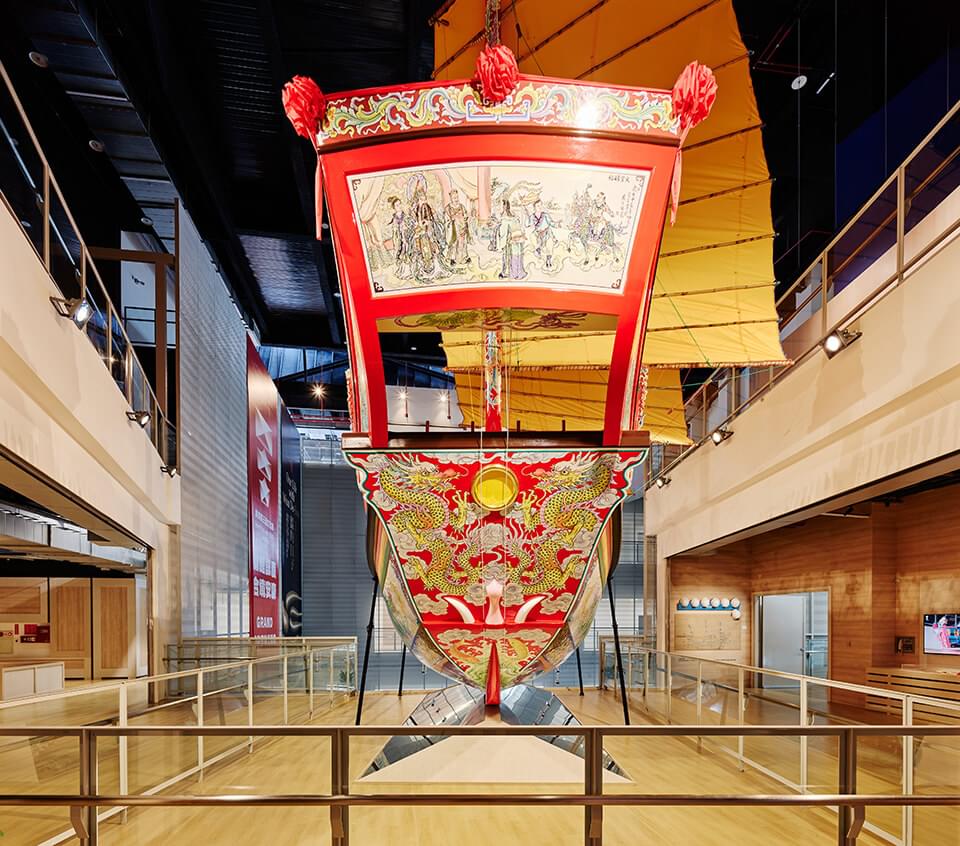
Xiaohai:
Whoa! What a huge boat.
People who don't attend the ceremony won't be able to see the King Boat. But the crowds are so big that I can’t get a good look at it either. Luckily, there’s a King Boat right here.
Dad: The King Boat used in the ceremony is completed the year before we welcome Wangye and burned when we send Wangye off. Donggang’s shipbuilders are old now, and the craft is in danger of being lost. To preserve the traditional methods, the museum invited highly experienced artisans to construct this life-size Donggang King Boat.
Shipbuilder: Hi. I’m a shipbuilder. I will introduce the King Boat to you. This Classic King Boat is 42 feet long, 11 feet 4 inches wide, and 15 feet high. Out of respect for the tradition, this one has the same proportions as the King Boats we see in the festival, but it’s a little smaller. It has all the standard King Boat features, such as the Five Kings’ residence and the Grand Duke’s residence, and the hull is painted with images of black tuna and swordfish, species native to the waters off Donggang. It embodies the essence of local culture.
Xiaohai: Great! I can visit Lord King Boat whenever I want!
Shipbuilder: It’s different from the divine King Boat! Since this one is for display only, it hasn’t been consecrated. Take a closer look at traditional shipbuilders' excellent craftsmanship and practical wisdom!

Xiaohai: The King Boat is so colorful!
Dad:
That’s right. Taiwan's economy took off in the 1980s. The prosperity is reflected in temple architecture's dazzling colors and intricate decorations. This King Boat is painted with historical stories of loyalty and filial piety, as well as auspicious dragon-and-phoenix patterns.
King Boat paintings are different in every region. In Pingtung, the bows are usually adorned with the three immortals of wealth, good fortune, and longevity––people believe they can attract wealth, bless and protect children, and promote longevity. Paintings of two or group dragon patterns appear on the upper part of the hull and on the stern.
Xiaohai: There are a lot of fish on the hull, too.
Dad: Yep. Many fishermen live in Pingtung, and they all hope for abundant catches. That’s why there are paintings of local fish species below the King Boat’s waterline.
Xiaohai: I see black tuna, a Donggang specialty, and swordfish, lobsters, and crabs.
Dad:
This is characteristic of King Boats in fishing communities. The paintings on Donggang boats are different from those in Hengchun. That's because they catch different species of fish in each area.
Donggang King Boats have another unique feature, Xiaohai. A pair of curved tiger teeth are made on the bows of most boats. But there’s a halberd between the tiger teeth on Donggang's King Boats because they're Lord Qian Sui’s warships. We call them "war halberds.”
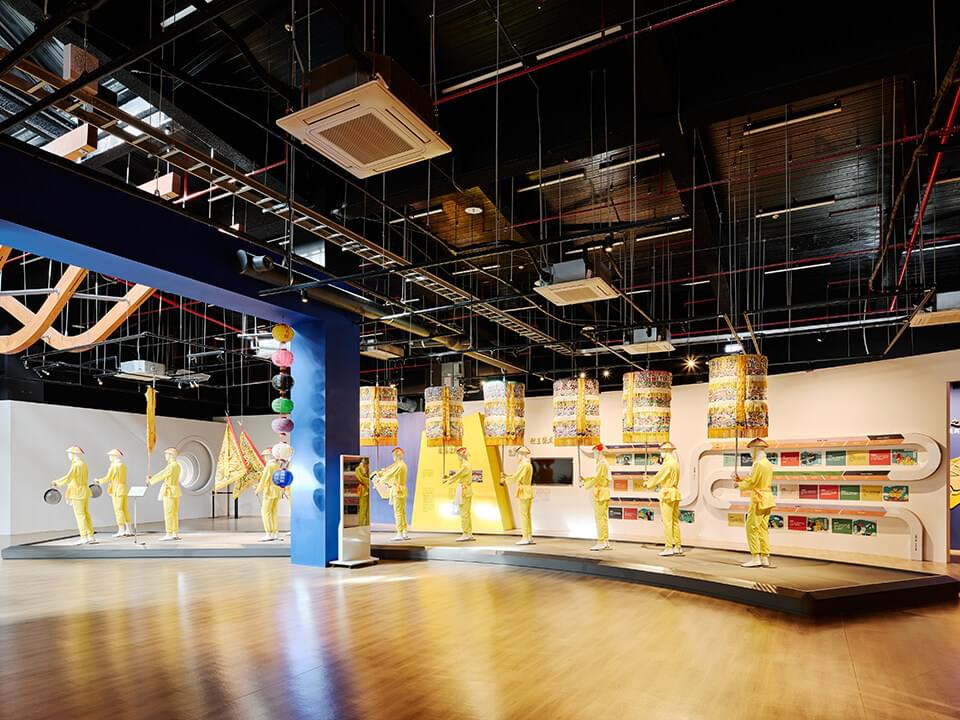
Xiaohai: Dad, what do we do when we welcome Wangye? I want to help.
Dad: There’s a lot to do. First, on the third day after we send Wangye off, lots are drawn to determine who will organize the next Wangye celebration. Then, we start building the King Boat two years in advance. The Zhongjun Troop is the Qian Sui lords’ military vanguard; they supervise the construction. When we say, “the Zhongjun Troop is seated," it means that the deities are overseeing the preparatory stages of ceremony.
Xiaohai: So the gods have to prepare too!
Dad: Yes. “Presenting a memorial” is the next step. A written statement inviting the Qian Sui lords to Donggang is burned in a golden incense burner. After that, we "set up Daitian Palace," a temporary residence for the Qian Sui lords. Then we formally invite Wangye. That means the ceremony is about to begin.
Xiaohai: You mean it’s only half finished?
Dad: Each step is very important. Next is the "fire passing" ceremony, which purifies the Wangye’s spirit tablet and sedan chair. After that, we hold a four-day procession through the town and countryside to expel goblins and evil spirits. Then we offer food to five Qian Sui deities. Finally, the King Boat is brought out from the shipyard, and the "boat procession” takes place the day before we send Wangye off.
Xiaohai: When everyone marches along with the King Boat, it’s a spectacular sight.
Dad: [chuckles] The "boat procession" wards off evil spirits and pestilence. Along the way, another ritual is performed to "pacify plagues and subdue demons." That brings peace and safety to the community.
Xiaohai: Wangye works days on end. It must be tiring!
Dad: That’s why we hold a royal banquet in the palace to thank the Qian Sui lords for their diligence during the eight-day festival.
Xiaohai: The Wangye send-off is the final step, right?
Dad: That’s right. We invite the Qian Sui lords to board the boat, and then we burn it.
Xiaohai: And then wait three years for the next ceremony.
Dad: Yes. Burning the King Boat means the festival completed successfully.
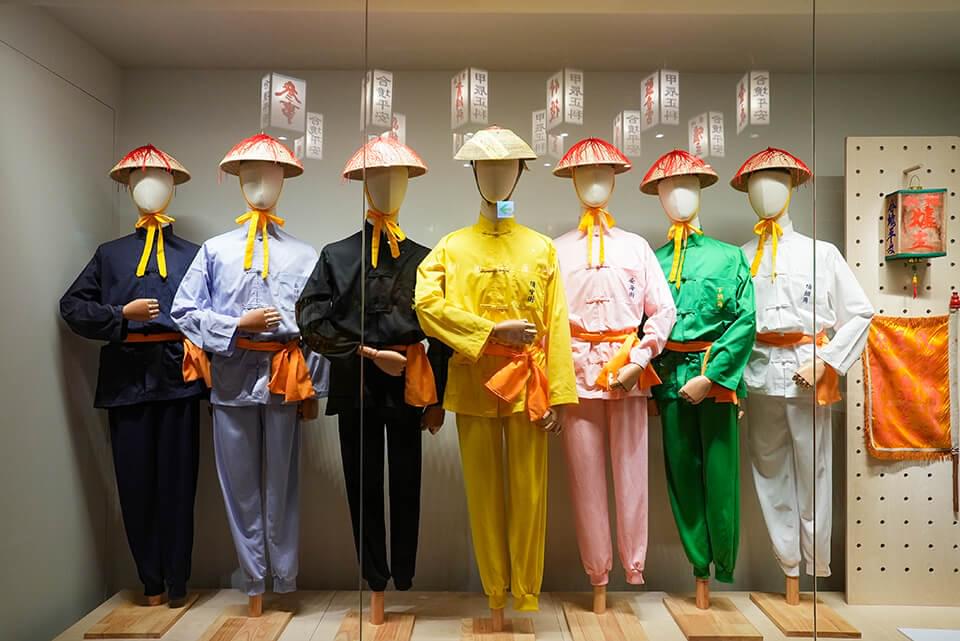
Xiaohai: Dad, what are the seven settlements?
Dad: Early on, Dongang encompassed seven settlements —the lower corner, lower middle corner, upper corner and four others. Each settlement has different customs and traditions. They're very close-knit, and all participate in the Wangye invitation ceremony. When we welcome Wangye, the seven settlements crews carry the sedan chairs of seven deities: the Five Qian Sui lords, the Donglong Temple Wen Wangye, and the Zhongjun Troop. In addition, when it's time for the boat procession and the Wangye send-off ceremony, the Qian Sui lords' crew moves the King Boat’s hull, and the other crews move various parts of the boat.
Xiaohai: How do they decide which crew is assigned to each sedan chair?
Dad: They’re chosen by drawing as I mentioned earlier.
Xiaohai: So the crews carry different deities’ sedan chairs in each ceremony?
Dad: Yes. The crew members are volunteers. The duties are passed from father to son and son to grandson, generation after generation. Many young people will return to their hometowns to help carry sedan chairs in the Wangye invitation ceremony. Also, you can see kids dressed in crew uniforms follow the adult crew members. The crews work very hard, so they're allowed to Daitian Palace and pay homage to the Qian Sui lords––it's a special privilege.
sedan-chair bearer: Coming home to participate in the invitation ceremony is a must for me. I’m a sedan-chair bearer, and I’m proud of it. Wearing the crew uniform is an honor. When older crew members pass away, they’re often buried with their uniforms.

Xiaohai: What are these, Dad?
Dad: They’re wooden Wangye tablets. They show that the Qian Sui lords are patrolling the neighborhood, protecting the people.
Xiaohai: Why are there so many? And why so many different colors?
Dad: Each color represents one of the five Qian Sui lords! When we welcome Wangye, the Jade Emperor sends the Qian Sui deities to Donggang. The first Qian Sui lord’s plaque is yellow, the second’s is red, the third’s is black plaque, the fourth’s is green, and the fifth lord’s plaque is purplish-gray.
Xiaohai: I get dizzy just hearing about it.
Dad: [chuckles] I’m not through yet! A blue plaque represents the landlord deity, Wen Wangye of Donglong Temple, and a white plaque signifies Wangye's vanguard, the Zhongjun Military Troop. The colors tell you which deity the plaques represent!
Xiaohai: Who makes the plaques?
Dad: They’re handmade by professional craftsmen. Xiaohai, have you noticed the delicate dragon patterns on the plaques’ surface? They’re created using a traditional technique called “powder line” or “coiled lacquer line”. A craftsman mixes plant lacquer and stone powder into clay and then rolls the mixture into thin lines and arranges them on the plaque to create the patterns.
Xiaohai: What happens to the plaques after the Qian Sui lords return to heaven?
Dad: They’re burned together with the King Boat, so new plaques have to be made every three years.
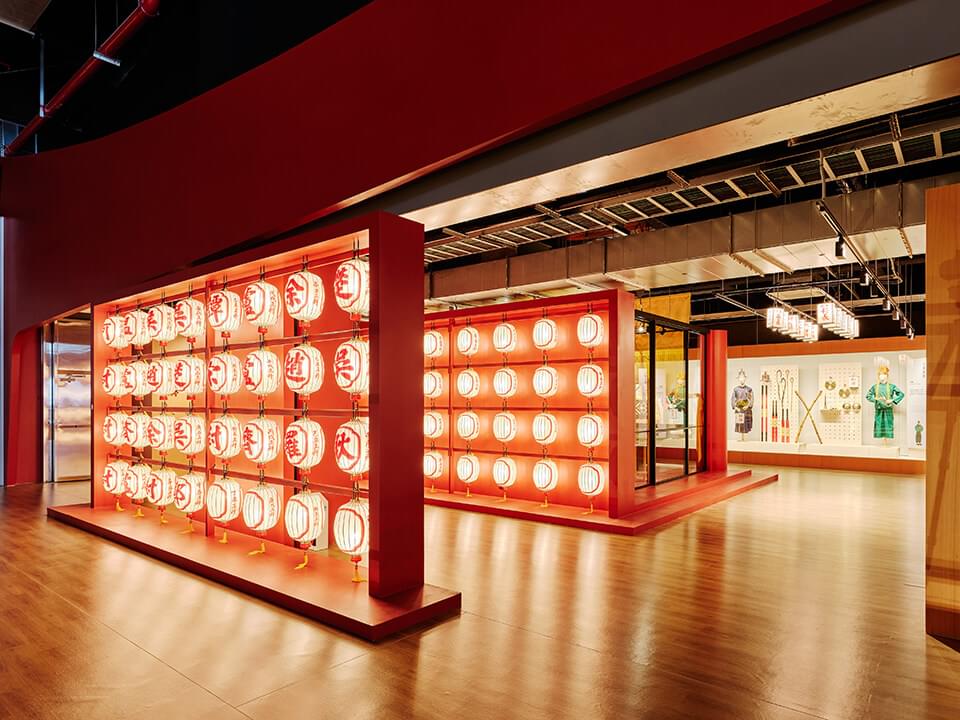
Xiaohai: Look, Dad! Those lanterns have different surnames written on them.
Dad: They’re surnames of the Qian Sui Lords who’ve visited Donggang in the past.
Xiaohai: Huh? Are they different every time?
Dad: Yes. The Wangye Festival invites five deities––the first, second, third, fourth and the fifth Qian Sui lord––and they have different surnames every time.
Xiaohai: How do we know which deities to invite. And how do we invite them?
Dad: The Wangye invitation ceremony is also called the “Water Invitation” because people believe the deities come on boats. Everybody goes to the beach at Zhenhai Village in Pingtung County to greet the Qian Sui lords.
Xiaohai: How do people know that the Qian Sui lords really arrived?
Dad: It’s one of the festival highlights! When the water-invitation team arrives at the beach, the "lucky lot" holders of each sedan chair, the Qian Sui lords’ spokesmen, ascend the "invitation platform" to report the deities’ surnames. Actually, the festival organizers cast divination blocks the day before, and the surname of the first Qian Sui has already been known. But they’re kept secret until the lucky lot holder announces it at the invitation ceremony. That means the Qian Sui lords have arrived.
Xiaohai: What if a lucky lot holder reports the wrong surnames?
Dad: He’ll be asked to step down, and the process continues until the correct surname has been announced. When that happens, the crowd on the beach erupts in cheers. The Qian Sui lord’s surname is written on flags and lanterns then and there.
Xiaohai: Wow, the Qian Sui lords have finally arrived. That’s great.
Qian Sui lord: Hello, everyone. It’s great to come to Donggang! I bless you all with peace, health, and happiness.
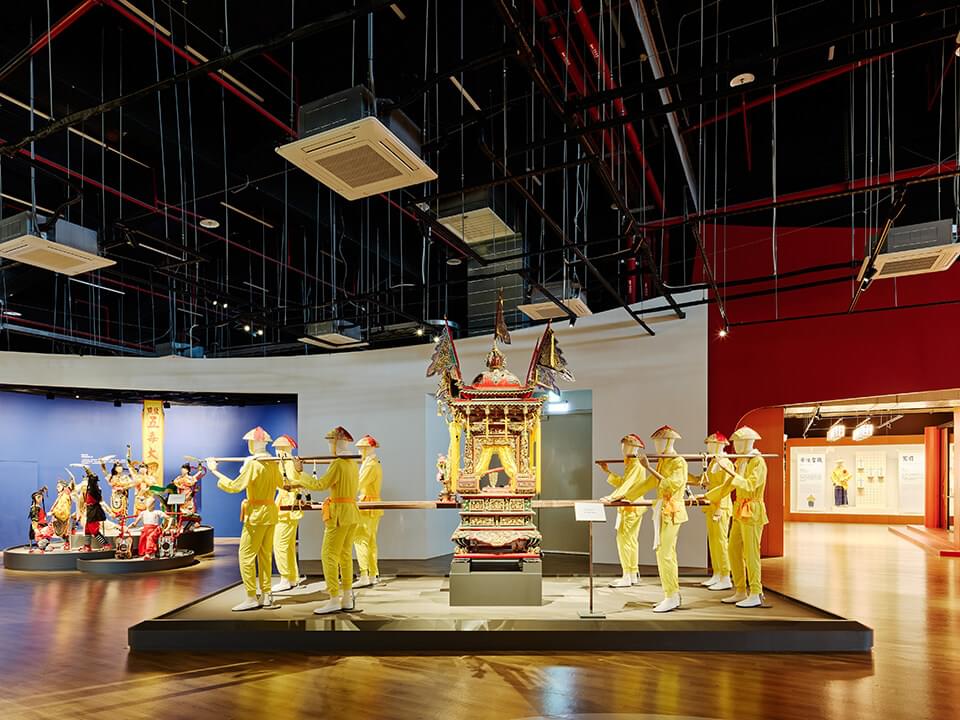
Xiaohai: I love the parades. Everybody’s setting off firecrackers. It’s so exciting!
Dad: The Qian Sui procession is a festival highlight. It's meant to expel evil spirits and diseases so people can live peaceful, trouble-free lives.
Xiaohai: Is the Qian Sui procession completed in a day?
Dad: The procession lasts for four days. It circles Donggang’s southern, northern, and central districts the first three days and parades through the countryside on the fourth day. Believers set up incense tables to welcome Wangye’s sedan chair, and temples prepare hay, water, and fruit for Wangye’s horse. The other religious troupes also follow the sedan chair.
Xiaohai: So many teams in the procession. How do they know where to meet?
Dad: Besides the local temples, other temples join in the procession as well! The teams gather at a designated location each day and set off after three cannon blasts. They proceed according to team numbers and the planned route. Wangye’s horse is at the head of the Qian Sui formation, followed by each of the seven settlements’ flags, dragon-and-tiger flags, seven parasols, and finally, the sedan chairs.
Xiaohai: Look! Each sedan chair crew is dressed in a different colored uniform, and they’re all wearing bamboo leaf hats.
Dad: They’re called “Lu Li”, a type of conical hat specifically worn by the sedan chair crew members in Donggang. The crews’ hats and belts are essential accessories. The color of each crew’s uniform represents a different deity: For example, the first Qian Sui lord’s color is yellow, the second’s is red, and the third’s is black. Each of the seven sedan chairs has a different colored headlight as well.
Xiaohai: I get it! The colors tell you which deity occupies each sedan chair.

Xiaohai: Wow! Dad, you see, the King Boat is really gorgeous!
Dad: Yes, indeed. It's modeled on ancient ship designs. The Wangye Palace in the center of the deck––it's the boat's most important part. The Qian Sui lords’ plaques are enshrined in the palace after they come aboard. The Grand Duke's residence is behind the palace. It includes an Eight Immortals table, armchairs, and other amenities. The Qian Sui lords work and rest there. Kitchens and bathrooms are on both sides of the Grand Duke’s residence.
Xiaohai: The King Boat is fully equipped!
Dad: The King Boats are three-masted sailing ships. Rectangular tablets engraved “Deities on Duty” and “During Patrol” are placed on either side of the hull near the bow for pomp and prestige. The circle in the center of the bow is the “surname frame.” After we welcome Wangye, the surname of the current year’s first Qian Sui lord is inscribed there.
Xiaohai: What do the five colored pennants on the stern stand for?
Dad: Those are the flags of the “Five Directions and Five Camps.” They represent armies guarding each of the five directions—east, west, north, south, and center. The colors are based on the principles of the Five Elements—earth, wood, metal, fire, and water. For example, the South Camp’s red flag, bordered in yellow, signifies that earth is generated from fire.
Xiaohai: Are the two small boats beside the King Boat for kids?
Dad: They’re shuttles—they can serve as either lifeboats or supply boats. The festival organizers want to ensure the Qian Sui Lords have everything they need.
Xiaohai: It looks like there are sailors aboard the King Boat too.
Dad: Certainly. There’s a captain, a helmsman, an incense tender, and a cook. The statuettes’ features and gestures let you guess which jobs they do!
Xiaohai: The Qian Sui lords will travel in comfort on the King Boat!
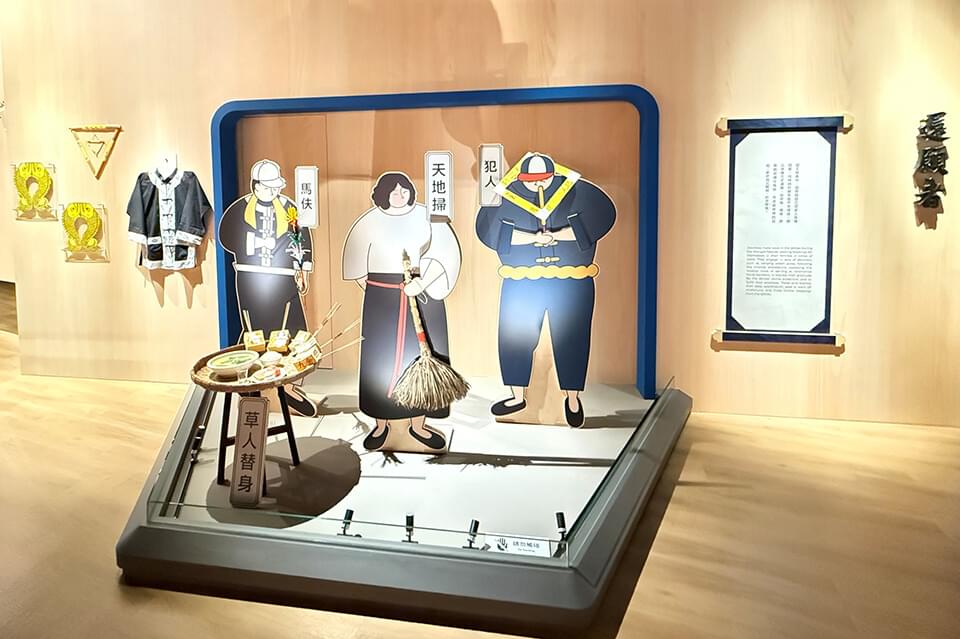
Xiaohai: Time passed by so quickly! We’re about to see Wangye off!
Dad: Wangye deities also set off from the beach at Zhenhai Village. The King Boat is loaded with gold joss paper, sacks of rice, and many other items. The Seven Settlement sedan chair crews move the boat to the seashore, and everybody burns incense to bid the Qian Sui lords farewell. When the King Boat goes up in flames, you’ll know it’s sailing back to heaven.
Xiaohai: Why is everybody so quiet now, Dad?
Dad: The Wangye invitation ceremony is lively, while the ceremony of sending Wangye off should be conducted with politeness, keeping in mind certain taboos. When the King Boat is burned completely, everybody kneels, prays, and plants joss sticks into the beach. Then we leave quietly, following the sedan chair. We can't make a sound, and we can’t look back either.
Xiaohai: I’ll be very, very quiet.
Dad: In the seven days after the Qian Sui lords departed, no bells, drums, public performances, or firecrackers were permitted. That's because the Qian Sui lords might think their followers were welcoming them back. We all remain quiet—if the plague demons and deities hear any noise, they'll return to Donggang. Today it's different now; we follow the restrictions for just three days. And fishermen aren't allowed to go to sea for three days. That's to prevent fishing boats from crashing into the invisible King Boat.
Xiaohai: I hope Lord King Boat sails smoothly, and the Qian Sui lords enjoy the journey. We’ll meet again in three years!
Lord King Boat & Qian Sui: Thank you all for your warm hospitality. Peace be upon you!
Dad: Thanks for listening, dear friends!
Dad & Xiaohai: You’re always welcome to visit us again in Donggang and at the King Boat Museum!

